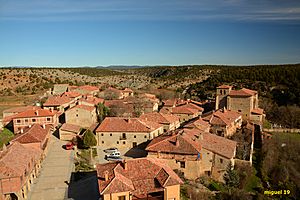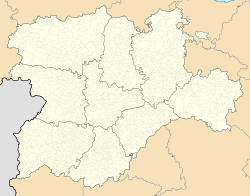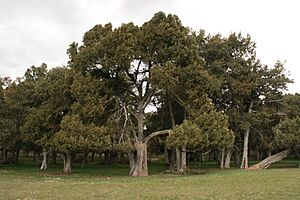Calatañazor facts for kids
Quick facts for kids
Calatañazor
|
|
|---|---|
 |
|
| Country | |
| Autonomous community | |
| Province | |
| Municipality | Calatañazor |
| Area | |
| • Total | 64 km2 (25 sq mi) |
| Population
(2018)
|
|
| • Total | 51 |
| • Density | 0.797/km2 (2.06/sq mi) |
| Time zone | UTC+1 (CET) |
| • Summer (DST) | UTC+2 (CEST) |
Calatañazor is a small town in Spain. It is located in the province of Soria, within the region of Castile and León. In 2018, about 51 people lived there. The town gets its name from a tiny, strong city built on top of a hill.
Two smaller villages, Aldehuela and Abioncillo, are also part of Calatañazor. Abioncillo was once empty, like many old villages in Spain. But in the 1980s, some teachers turned it into a special learning center.
Contents
The Battle of Calatañazor
A very important historical event happened near Calatañazor. In the year 1002, a big battle took place in the valley between Calatañazor and Abioncillo. This battle is known as the Battle of Calatañazor.
This valley is still called el valle de la sangre, which means "the Valley of Blood." Some historians believe that Almanzor, a powerful Muslim ruler from Al-Andalus, died in this battle. There is a statue of Almanzor in Calatañazor today.
Nature and Ancient Sites
Calatañazor is home to some amazing natural spots.
The Juniper Forest
In the nature reserve called El Sabinar de Calatañazor, you can find a special kind of juniper tree. These trees are called Juniperus thurifera, or Spanish junipers. Some of them are the biggest found anywhere in the Iberian peninsula.
The Fuentona Spring
More of these large juniper trees grow near an underground river called the Abión. This river comes to the surface at a natural heritage site called the Fuentona de Muriel. This spring is very popular, especially with advanced cave divers who explore its underwater passages. Locals call this spring El Ojo de la Mar, meaning "the eye of the sea."
La Cueva Maja
Near Abioncillo, there's a cave called La Cueva Maja. Inside, you can find drawings that are about 4,000 years old! These ancient drawings give us a peek into the past.
Ancient Elm Trees
In the centers of both Abioncillo and Calatañazor, you can see elm trees that are hundreds of years old. In ancient Celt-Iberian times, these trees were very important symbols.
What's in a Name?
The name Calatañazor comes from an old Arab phrase, Qalat al-Nusur. This phrase can mean two things:
- "Castle of Azure" (azure is a bright blue color)
- "Castle of Vultures"
Both meanings suggest a strong, high place, which fits the town's location on a hill.
Gallery
See also
 In Spanish: Calatañazor para niños
In Spanish: Calatañazor para niños
 | Sharif Bey |
 | Hale Woodruff |
 | Richmond Barthé |
 | Purvis Young |











